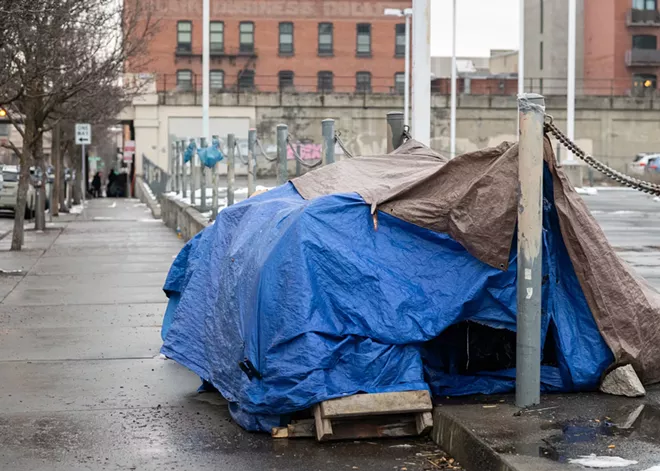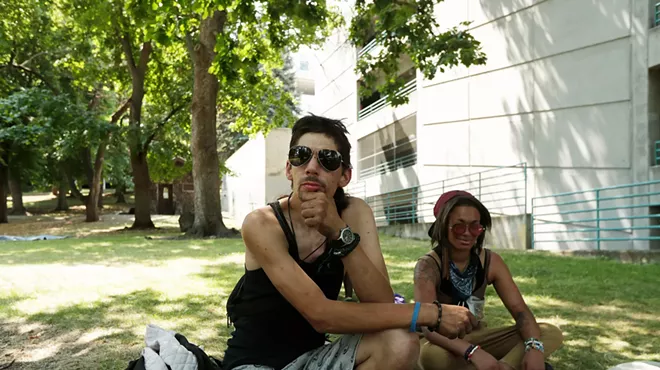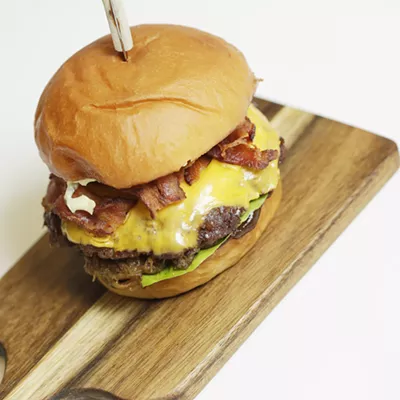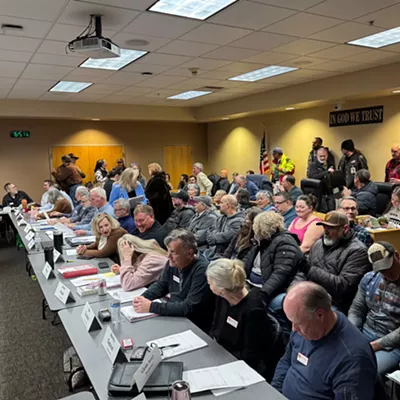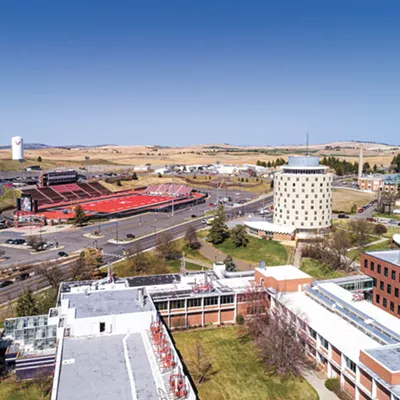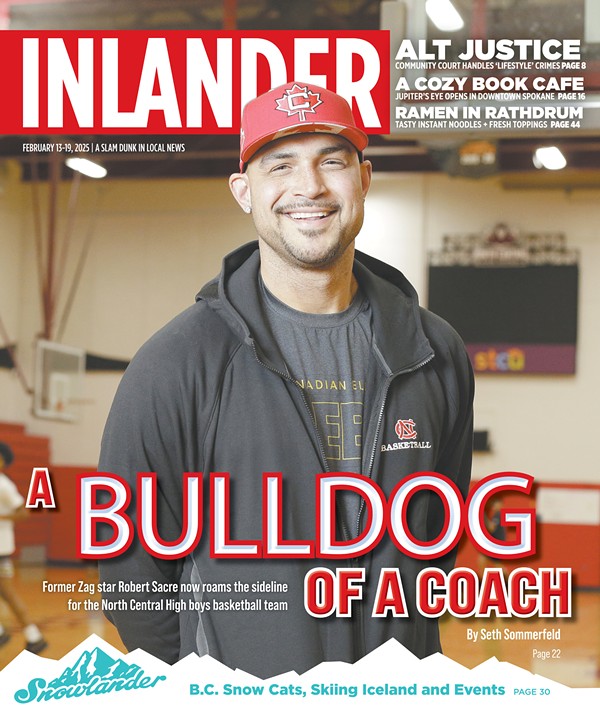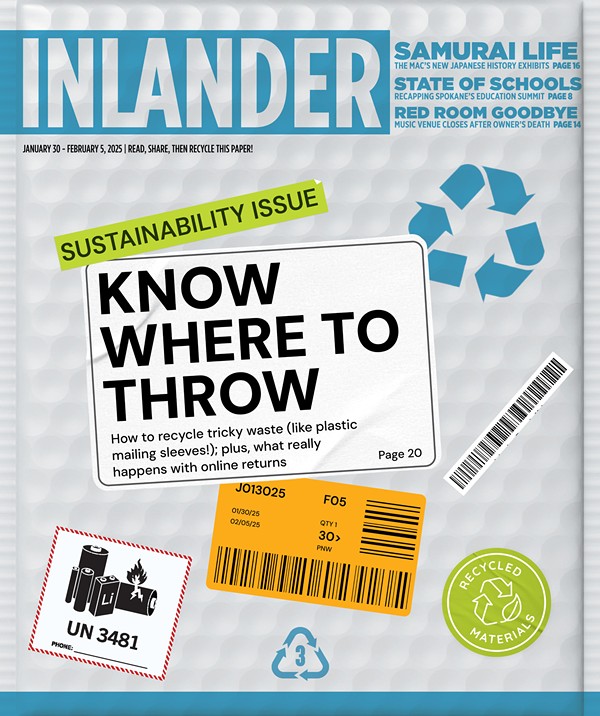In a historic decision that could have sweeping ramifications across the American West, the U.S. Supreme Court ruled on Friday that cities are allowed to criminalize camping on public property — even if there isn't sufficient shelter space.
The ruling represents the Court's most significant decision on homelessness in decades, and could have big implications for how numerous cities — including Spokane — respond to public camping.
The opinion stemmed from a 2022 Court of Appeals case that blocked the city of Grants Pass, Oregon, from enforcing its public camping ban during nighttime hours. The Ninth Circuit Court of Appeals found that such camping bans violate the Eighth Amendment's protections against cruel and unusual punishment. Basically, that court ruled that cities shouldn't punish someone for sleeping outside if there's nowhere else for them to go.
The precedent set by that ruling — and its 2019 predecessor, Martin v. Boise — has frustrated leaders in numerous western cities.
In September last year, former Spokane Mayor Nadine Woodward joined leaders from Seattle, San Diego, Colorado Springs and about a dozen other cities in filing an amicus brief asking the Supreme Court to overturn the Grants Pass case — arguing that it had “paralyzed” cities and tied the hands of local lawmakers as they struggled to respond to problems associated with public camping.
The court agreed to hear the case. On Friday, in a 6-3 decision split along ideological lines, the conservative majority ruled to overturn the ruling and remand the case to the lower court for a new decision. Specifically, the justices held that camping bans do not constitute cruel and unusual punishment.
“A handful of federal judges cannot begin to ‘match’ the collective wisdom the American people possess in deciding ‘how best to handle’ pressing social questions like homelessness,” Justice Neil Gorsuch wrote for the majority.
Justices Ketanji Brown Jackson, Elena Kagan and Sonia Sotomayor dissented, calling it "unconscionable and unconstitutional" to criminalize people for sleeping outdoors.
"For some people, sleeping outside is their only option," Sotomayor wrote in their dissent.
Conservative Spokane City Council member Jonathan Bingle, who has long advocated for the city to take a more active approach to removing encampments, celebrated the news as a major victory.
“I could not be more thrilled for the city and the way it’s going to allow the city to operate moving forward,” Bingle says.
But for homeless advocates like Julie Garcia, the CEO of Jewels Helping Hands, Friday’s news was a major blow.
“It’s devastating,” Garcia says. “There’s no protection for them under the law any longer.”
LOCAL IMPACT
It is still unclear what the ruling means for Spokane, where leaders have spent years struggling to craft laws that mitigate public camping while complying with Grants Pass v. Johnson and Martin v. Boise.
Last fall, Spokane voters passed Proposition 1 — a citizen-led ballot initiative that made it a misdemeanor to camp on public land within 1,000 feet of schools, parks, playgrounds and child care facilities. The law massively expanded the city’s camping restrictions to cover more than 60% of the city.

Mayor Lisa Brown and other progressive candidates who ran for office that fall were opposed to Proposition 1. They said they understood people’s frustrations, but that the law would be difficult to enforce and likely face legal challenges. They also said the law would simply result in people being pushed around to different parts of the city.
Voters seemed to disagree, and the initiative passed with 75% of the vote in November. But the new law hasn’t been enforced.
In February, Brown’s spokesperson Erin Hut told the Inlander that, while the city respects the will of the voters, Proposition 1 is “squarely at odds” with the provisions of Grants Pass and the related Martin v. Boise case.
In an interview on Thursday this week, the day before the ruling was released, Brown said police have continued to respond to camping complaints across the city, but have yet to issue any citations to people for violating Proposition 1.
“The police department hasn’t chosen to cite under that proposition since we’re anticipating the court case decision to be revealed any day now,” Brown said.
When asked if a ruling on the Grants Pass case would change how the city approaches Proposition 1, Brown said “I don’t really know.”
“I have asked my team to look into what they think the implications of a decision [would be]," Brown said.
The mayor added that court cases are rarely just an “either-way” decision.
“Court cases can be very nuanced,” Brown said. “So we will obviously take a look at the decision and see if it has any implications.”
Brown stressed that, when police arrive to an encampment complaint, a citation isn’t usually necessary because people tend to move along voluntarily.
Brown released a statement shortly after the ruling Friday that did not directly mention Proposition 1. She said the city has been and will continue to respond to unlawful camping violations, and that she is committed to “getting to the root causes of the unhoused crisis by making investments in mental and behavioral health care, expanding access to substance use treatment and creating more transitional and permanent housing.”
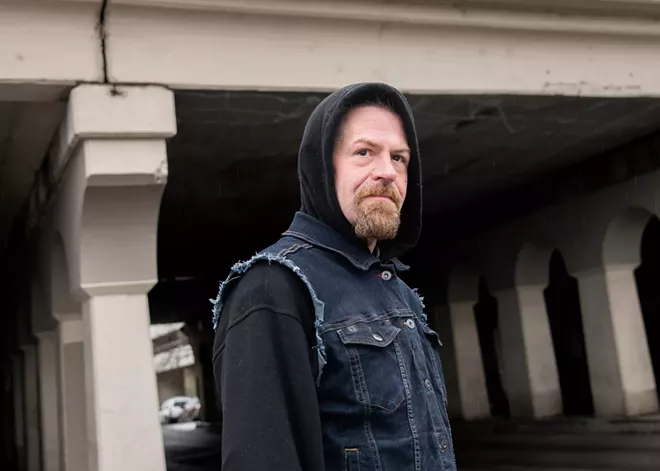
'SLEEP IS A BIOLOGICAL NECESSITY'
The work to gather signatures to place Proposition 1 on the ballot was largely funded by Larry Stone, a prominent businessman and conservative political donor who owns the Trent Avenue warehouse that the city leases for use as a homeless shelter.
Stone and others who supported Proposition 1 have repeatedly criticized the Brown administration for the lack of enforcement since the measure passed.
"We spent over $1 million on Prop. 1, it's pretty sad that we had to spend all this as the business community, but we are still fighting," Stone said during a meeting of the East Central Business Association last month.
Bingle hopes the ruling will change the administration's approach to enforcement.
"There's no more excuses, let's enforce the laws," Bingle says. "I hope this means that we as a city are going to take this seriously and move forward."
In addition to the U.S. Supreme Court case, Brown’s administration has also said it is waiting for guidance from the Washington state Supreme Court, which recently agreed to hear a challenge to Proposition 1 filed by Garcia, with Jewels Helping Hands, and Ben Stuckart, the director of the Low Income Housing Consortium.
Garcia and Stuckart filed the lawsuit last summer. Instead of challenging the constitutionality of the policy itself, they argued that Proposition 1 could not be placed on the ballot because it went beyond the scope of what the local initiative process allows.
In August, Spokane Superior Court Judge Tony Hazel denied their request to remove it from the ballot. An appeals court upheld his ruling in December. Garcia and Stuckart filed an appeal with the state Supreme Court, which is not set to hear oral arguments until September.
Bingle argues that the pending state Supreme Court case shouldn’t stop the city from enforcing Proposition 1 because the legality of the law itself isn’t being challenged.
In February, Stuckart told the Inlander that a lawsuit challenging the constitutionality of Proposition 1 wasn’t possible because there weren’t any examples of people being harmed by it.
Garcia thinks her state Supreme Court appeal has a “50-50” chance of succeeding.
Garcia says she understands the concerns of people who voted for Proposition 1, and agrees that homeless people shouldn’t be camping near schools and playgrounds. But the problem, she says, is that you can’t tell someone where they can’t be if there isn’t anywhere else for them to go. Without sufficient shelter space, people will just end up pushed around to other neighborhoods, she says.
“Their concerns are valid, but the question still needs to be answered: If you don’t want them here, then where do they go?” Garcia says. “We can’t just close our eyes and pretend they don’t exist, that’s not solving the problem.”
Justice Sotomayor echoed Garcia’s concerns in her dissent, writing that “Sleep is a biological necessity, not a crime.”
Sotomayor added that camping laws will likely be subject to further litigation.
In a statement, the ACLU of Washington said it will continue to “challenge efforts and policies across the state that seek to criminalize people experiencing homelessness.”
“Everyone deserves a safe space to sleep, but for too long we have been overly reliant on policing as a solution,” said Michele Storms, executive director of the ACLU of Washington. “We cannot punish our way out of homelessness and poverty.”

